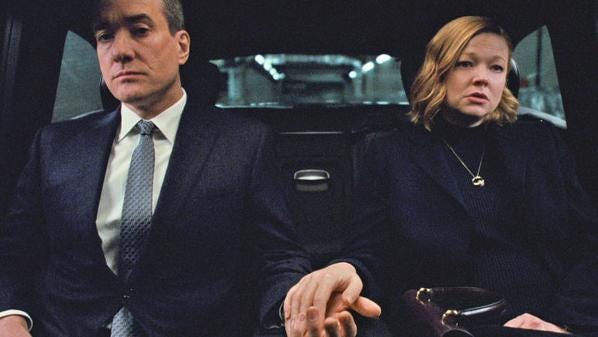Notes on Succession
Life is not a story
The finale of Succession ends on a shot of Kendall Roy staring at a body of water in which he cannot lose himself, suicide being an act of independence that isn’t afforded to him. Even at his most alone, he is surveilled by Colin, his father’s bodyguard, fixer and, now, ghost. Like Logan, Colin provides security without comfort, whether Kendall wants it or not.
Apparently, they shot versions of the scene in which Kendall tries to throw himself in but is stopped by Colin. I think they did the right thing, as usual, by implying this rather than showing it. Succession was very good at knowing what to leave out.
Closing the show on Kendall on a bench, alone, made dramatic sense, but it didn’t make for a stunning final shot. The episode’s most memorable image is of Shiv and Tom in the back of a limo, like monarchs on twin thrones: joining hands, but not clasping them. The whole show turns on the differences between those two states; between an alliance and a commitment, the conditional and the permanent - and between security and affection, marriage and love, a rock and a soft place.
I have to admit it’s somewhat changed my reading of An Arundel Tomb:
To jump metaphors: Tom is Stalin. I didn’t think about this until I heard Jesse Armstrong make the connection on the excellent Firecrotch and Normcore podcast. Not in the sense that Tom is about to kill twenty million people but in the sense that he is the uncharismatic and socially inferior grafter who comes from behind to take the top prize (for Shiv, Kendall and Roman, read Bukharin, Lenin and Trotsky). As Armstrong remarked, this is often how it goes in large companies; a relentless mediocrity, a pain sponge, rises to the top, while more glamorous but lazier contenders fall by the wayside.
Did Tom win? He certainly seemed to think so. Matthew Macfadyen did a masterful job of showing us a man suddenly suffused with power: head held higher, shoulders back, taking decisions with a nod or a whisper: letting Hugo know where to get off, letting Shiv know to where to get on. But with that winded motherfucker after Matsson humiliated and promoted him at the same time, Macfadyen also made us feel how joyless and empty his victory was.
Some novels grip you from the opening pages, some never at all, others teach you how to like them. Same goes for TV shows. The first series of Succession was funny and brilliant enough to keep me watching but I found all the characters annoying and the total absence of goodness or honesty unsatisfying. Logan Roy seemed one-dimensional compared to Tony Soprano. In the second series, I stopped worrying about any of this and became absorbed by its world. I don’t think this is because the writing changed in some fundamental way. I think it’s because the show taught me how to like it.
Roman, in the final episode, to Shiv on the beach: “What goes around, comes around.” Succession gets compared, favourably or unfavourably, to The Sopranos or Mad Men, but those shows are about complex characters who go on long journeys. The characters in Succession do not have arcs; they have loops. They travel from A to B and then back to A, before gamely setting off on another circuit. And we follow them.
The question isn’t why Jesse Armstrong decided to end his own series but how on earth he managed to make it so riveting for so long. Succession succeeded because he and his team (actors and writers) created characters who are so compelling (which is not the same as complex or mysterious) that they could be dropped into a hundred different situations and we would gladly watch them react, and not be bored by the the knowledge that they’re not really going anywhere but around again.
Logan Roy is like a Martin Amis character - a banality delivered with tremendous force. His brute simplicity, his narrow emotional range, the absence of character development - these are not weaknesses of the writing but the whole point. If you spent 365 days and nights with Rupert Murdoch I doubt that you would learn much more about his character that you couldn’t pick up in half an hour. I don’t even mean that as a criticism - I’m just saying, not everyone is multi-faceted and complex and protean. In fact, simple but tremendously forceful people are probably the people best suited to the building of business empires.
Such single-mindedness is hard to portray in fiction and drama in an interesting way. Complex characters tend to make for better stories. That’s why I think Succession pulled off a remarkable high-wire act. Maybe this is too tangential, but its achievement reminds me a little of what Karl Ove Knausgaard and Rachel Cusk did with the novel in recent years. Strip away conventions assumed to be fundamental to the form and see if you can make it work anyway.
In any other TV series, that bomb buried in the first series - Kendall Roy killing a waiter - would have exploded in the finale, in a way that satisfied our expectations of moral justice. Armstrong let it fade out with a whimper. Kendall didn’t face the consequences of his actions. Of course he didn’t.
In the world of Succession, money melts everything solid into hot air - into words. The dialogue is torrential, as abundant as money itself. Words glitter and seduce and cut and wound and never conclude - never, really, mean a thing. The one proposition on which Kendall and Roman agree, by the end, is that everything is bullshit. Again, this presents a dramatic challenge. Stories need stakes, and if all the business shenanigans and the declarations of love or fealty essentially add up to nothing, a heap of bullshit, then it’s hard to make viewers care about any of it. But we did care, because for some reason we cared about these dreadful people.
Succession proves John Updike’s axiom, that readers (or viewers) don’t actually worry about whether characters are good or bad; what they respond to is life; characters who leap off the page. Logan, Roman, Kendall, Shiv, Tom - my God they felt alive, which is why people are sincerely discussing what will happen to them now the show is done. Updike said his aim in fiction was “non-judgemental immersion”. That’s what Succession does. It takes an amoral view of its characters. That doesn’t make it an amoral show, quite the opposite. Amorality is the method by which it cultivates our moral intelligence.
In that final desperate scene with his siblings Kendall recalls how his father sat him down at the age of seven and told him he wanted him to succeed him one day. “It was a terrible thing to do,” he says, and the others agree. One of the wisest creative decisions Armstrong makes is to give his characters a fair degree of self-awareness. The bleak truth is that even the ability to have insight into yourself isn’t always sufficient for change. By the end of the series, Roman might have come out the other side of something, but the others are back where they started.
Succession is a spiritual cousin of Seinfeld, a show about nothing that’s also about everything. “No lessons, no hugs”. (Well, in this case, there were some hug-type behaviours; quasi-hugs; anti-hugs). But Succession is more closely related to classic British sitcoms. In Fawlty Towers and Only Fools and Horses - and Peep Show - the characters go round and round, trapped by their flaws, and we can’t stop watching them. We want to see how they’ll do in the next situation, or what the next situation will do to them.
These are really two different visions of life. In one, we gather wisdom as we go, undergoing trials and tribulations, being changed or changing ourselves in fundamental ways. In the other, we are who we are and there’s nothing we can do about it. We lug our selves around from one situation to the next hoping that the next one suits us better. It’s life as a story, versus life as a series - a succession - of scenes.
They’re also two different visions of history. Mad Men purports to tell the story of twentieth century America in microcosm. Succession focuses on the American moment. There’s no spirit of history in the British vision, no owl of Minerva (well, Del Boy has 200 stuffed owls of Minerva, off the back of a lorry, a fiver each).
Edward St Aubyn on the very rich: “without the editorial influence of the word ‘afford’, their desires rambled on like unstoppable bores, relentless and whimsical at the same time.”
It’s a cliché to say that a show is “really about us” but I do think Succession isn’t just about the superrich. After all, anyone who can afford to watch this show is superrich by the standards of human history. I wouldn’t have it any other way, but it does sometimes seem that the further we get from war and hardship the sillier we become. We are bullshit. Or at least, it can feel that way.
There is no series-defining line of dialogue in the finale because that line was delivered in the second episode, by the one character who, for all his awfulness, did seem to be hewn out of rock: “I love you. But you are not. Serious people.” I don’t know about you, but I took it as a personal rebuke.
Join me after the jump for a few more thoughts on Succession plus a juicy fruitbowl of links including a gorgeous arrangement of tune you know well.





